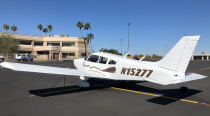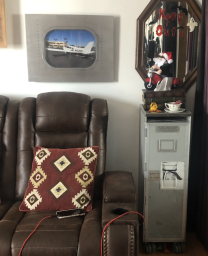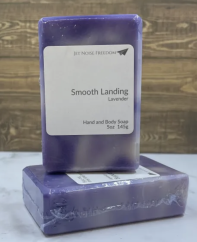
Air Carrier Labor Law
Microsoft Power Point presentation [3.9 MB]
Microsoft Power Point presentation [4.5 MB]
Microsoft Power Point presentation [4.5 MB]
Microsoft Power Point presentation [1.9 MB]
Adobe Acrobat document [6.9 MB]
Air Line Pilots Association (ALPA)
The Railway Labor Act (RLA) of 1926 – governs labor relations in the air carrier industry as of 1936 – to minimize interference in interstate commerce caused by labor disputes in the mass transportations industries while insuring transportation employees’ right to engage in collective bargaining and collective action
Railway Labor Act - Full text
Jurisdiction:
§ 181. Application of subchapter I to carriers by air
All of the provisions of subchapter I of this chapter except section 153 of this title are extended to and shall cover every common carrier by air engaged in interstate or foreign commerce, and every carrier by air transporting mail for or under contract with the United States Government, and every air pilot or other person who performs any work as an employee or subordinate official of such carrier or carriers, subject to its or their continuing authority to supervise and direct the manner of rendition of his service.
National Mediation Board (NMB) applies a 2-pronged test to determine whether a company fits the definition of "common carrier by air engaged in interstate or foreign commerce:
1. function test - whether the work is of a nature traditionally performed by employees of air carriers
2. control test - whether a common carrier exercises direct or indirect control over the work
NMB has jurisdiction over:
- companies providing scheduled air service
- air charter companies
- air ambulance services
- fractional aircraft operator also holding a 14 CFR Part 135 operating certificate
- FBOs providing air taxi, charter and on-demand air transport along with aircraft rental, refueling, and aircraft maintenance
General characteristics of the RLA:
- union or agency shops
- compulsory mediation and opportunity for binding arbitration
- postponement of right to strike
2 types of air carrier labor law cases:
- representation
- disputes
Representation cases
- to raise interest union distributes information and air carrier may not interfere
- union circulates authorization cards to prospective members
- if 50% of employees eligible to vote sign authorization cards an election is justified
- union petition NMB to hold an election
- NMB investigates workers to determine who are “labor” (and can vote) and who are “management” (and cannot vote)
- Election is held under NMB supervision
- If simple majority of those who cast ballots, cast them in favor of union, then NMB certifies union as official collective bargaining representative
- Once union is certified it has exclusive authority to represent all of air carrier’s employees
- Union has duty of fair representation of all of air carrier’s employees
- Upon certification, union will enter into negotiations with company management for an employment contract
- Both sides have a legal duty to bargain in good faith
- Once a new contract is negotiated union must present contract to affected members for ratification or rejection
- If simple majority rejects the union returns to bargaining table and resumes negotiations
Dispute cases
2 categories:
1. minor disputes – grievances – disputes over interpretation and application of employment contract e.g. employee discipline
RLA requires that employment contract provide for creation of System Board of Adjustment to resolve minor disputes – minor disputes cannot be brought in front of court except in rare exceptional cases
Due process of law guarantees these rights:
- to have a hearing before a fair and impartial decision maker
- to have adequate notice of the nature of the charges and of the time and place of the hearing to allow one to prepare
- to be represented by legal counsel if one chooses
- to testify and present witnesses and evidence on your behalf
- to cross-examine witnesses for the opposition
2. major disputes – involve negotiation of either a new employment contract or a change to the existing contract – aka Kabuki Theater – until procedure completed RLA requires status quo be maintained
Collective bargaining agreements do not expire – they have an amendable date
Kabuki Theater procedure:
- party desiring change must notify the other side in writing aka Section 6 notice
- both sides must then confer within 30 days and bargain in good faith – trade offs and counter proposals at this stage which continues until impasse
- if impasse then either side can request mediation by NMB
- if mediator declares impasse NMB will offer the opportunity for binding arbitration
- panel of 3 arbitrators – decision is final and cannot be appealed
- if either party rejects arbitration as a method of dispute resolution there is a mandatory 30-day cooling off period during which parties must keep the status quo
- not uncommon for supermediation at this point: meeting with 1 of 3 presidential appointees to NMB designed to bring visibility and political pressure to bear on the parties to reevaluate their positions one last time
- after cooling off period and still no resolution parties are free to resort to self-help – strikes etc
Presidential Emergency Board (PEB) – last effort to aid parties in reaching agreement without disruptions of a strike
Wildcat strikes – employees acting independently of the union – injunction compelling workers to go back to work – back to work order – if not then held in contempt of court and fined and/or imprisoned
In proceedings for reorganization of companies under Chapter 11 of the Bankruptcy Code bankruptcy judges are empowered to order modification or termination of collective bargaining agreements and often wield that power in their efforts to restructure the company to improve its chances of survival
American Federation of Government Employees (AFGE)
Microsoft Word document [51.0 KB]
Personal Jurisdiction
Walden v. Fiore - specific jurisdiction - 3 part test:
1. non-resident defendant must purposefully direct his activities or consummate some transaction with the forum or a forum resident, or perform some act by which he purposefully avails himself of the privilege of conducting activities in the forum, thereby invoking the benefits and protections of its laws
2. claim must be one which arises out of or relates to non-resident defendant's forum-related activities
3. exercise of jurisdiction must comport with fair play and substantial justice (must be reasonable)
Terracom v. Valley Nat. Bank - 7 reasonableness factors
Rice Aircraft Services, Inc. v. Soars
Everett v. BRP-Powertrain, GmbH, & Co. KG
Sutcliffe v. Honeywell Intern., Inc.
Daimler AG v. Bauman - Court nearly eliminates general jurisdiction
Goodyear Dunlop Tires Operations, SA v. Brown - Court nearly eliminates general jurisdiction
Williams v. MD Helicopters Inc. - Court restricts use of general jurisdiction
Brady v. Southwest Airlines Co. - both general and specific jurisdiction
Mullen v. Bell Helicopter Textron
ITL Int'l, Inc. v. Consenla, SA
Davidson v. Honeywell Intern. Inc.
Carpenter v. Sikorsky Aircraft Corp.
Lothrop v. North American Charter Inc.
JB Aviation v. R Aviation Charter Services, LLC
Luvin v. Delta Airlines, Inc.
Subject Matter Jurisdiction
Flylux, LLC v. Aerovias de Mexico, SA de CV
Removal
A. Federal Officer removal under 28 USC 1442
Lu Junhong v. Boeing Co. - based on admiralty jurisdiction
Watson v. Philip Morris Companies, Inc.
Executive Jet Aviation v. Cleveland
Offshore Logistics, Inc. v. Tallentire
B. Removal based on Preemption
Crown v. PHI Air Medical LLC - complete preemption
Batteries R US Co. v. Fega Express Corp.
C. Fraudulent Joinder
D. Other
Bullar v. US Specialty Ins. Co.
Forum non Conveniens
Lumenta v. Bell Helicopter Textron, Inc.
Bjorkstam v. MPC Products Corp.
Preemption
A. Field Preemption
Cleveland v. Piper Aircraft Corp.
Sikkelee v. Precision Automotive Corp.
Cleveland v. Piper Aircraft Co.
Estate of Becker v. Forward Technologies, Inc.
Ahmadi v. United Continental Holdings, Inc.
Spadoni v. United Airlines, Inc.
Blackwell v. Panhandle Helicopter Inc.
B. Foreign Sovereign Immunities Act (FSIA) - 28 USC 1605
- affords the "sole basis" for obtaining jurisdiction over a foreign state in the United States - if plaintiffs fail to satisfy the terrorism exception to the FSIAthe claim requires dismissal
OBB Personenverkehr AG v. Sachs
Abdel-Karim v. EgyptAir Airlines
Flanagan v. Islamic Republic of Iran
Aureus Asset Managers, Ltd. v. United States
Mohammadi v. Islamic Republic of Iran
C. Airline Deregulation Act (ADA)
National Federation of the Blind v. United Airlines, Inc.
Charas v. Trans World Airlines, Inc.
Rowe v. New Hampshire Motor Transport Ass'n
Xiaoyun Lu v. AirTran Airways, Inc. - 49 USC 44902(b) absolves air carriers of liability for refusal to transport to a passenger if the carrier decides the passenger is, or might be, inimical to safety
inimical: tending to obstruct or harm
Valencia v. SCIS Air Security Corp.
Grupp v. DHL Express (USA) Inc.
Morales v. Trans World Airlines Inc.
American Airlines, Inc. v. Wolens
Pac Anchor Transp., Inc. v. California ex rel. Harris
Glisan v. United Airlines
David v. United Continental Holdings, Inc.
Segalman v. Southwest Airlines Co.
Aviation and Transportation Security Act (ATSA)
Montreal Convention (and Warsaw)
A. Limitations of Actions
Cattaneo v. American Airlines, Inc.
D'engle v. City of New York
B. Defendants subject to Convention
C. Venue
Avalon Technologies Inc. v. Emo-Trans, Inc.
Atlantic Marine Const. v. U.S. District Court for W. Dist. of Texas
D. Bodily Injury
E. Delay
Smith v. American Airlines, Inc.
F. Accident
Naqvi v. Turkish Airlines, Inc.
Nguyen v. Korean Air Lines Co. Ltd
Blansett v. Continental Airlines, Inc.
G. Cargo
Batteries R US Co. v. Fega Express Corp.
Yoly Farmers Corp. v. Delta Air Lines, Inc.
H. Other
Narkiewicz-Laine v. Aer Lingus Limited
Product Liability
A. Proof of Defect
City of New York v. Bell Helicopter Textron, Inc.
Sikkelee v. Precision Automotive Corp.
Crouch v. John Jewell Aircraft Inc. - challenges to qualifications or methodology of experts
Linfoot v. McDonnell Douglas Helicopter Co.
SOCAR (Societe Cameroonaise d'Assurance et de Reassurance) v. Boeing Co.
A. Limitations of Actions
United States v. Kwai Fun Wong
Menominee Tribe of Wis. v. United States
B. Air Traffic Control
C. Federal Employees
D. FECA
Class Actions
Volodarskiy v. Delta Airlines Inc.
Ranbarran v. Dynamic Airways LLC
Insurance
A. Compulsory Insurance Doctrine
Northwest Airlines, Inc. v. Professional Aircraft Line Service (PALS)
B. Ripeness of Declaratory Judgment Action
Quest Aviation, Inc. v. Nationair Insurance Agencies, Inc.
C. Life Insurance
Williams v. National Union Fire Ins. Co. of Pittsburgh
Florida Tube Corp. v. Metlife Ins. Co. of Connecticut
Punitive Damages
Manufacturers Collection Co. LLC v. Precision Airmotive LLC
Airports/Nuisance
City of Dallas v. Delta Airlines, Inc.
Lewis v. Bell Helicopter Textron, Inc.
City of Burbank v. Lockheed Air Terminal Inc.
Friends of the East Hampton Airport, Inc v. Town of East Hampton
In re Flyboy Aviation Properties, LLC
Pofolk Aviation Hawaii, Inc. v. Department of Transp. for State
DBT Yuma LLC v. Yuma City Airport Authority
Civil Procedure
A. Twiqbal
Cheramine v. Panther Helicopters Inc.
B. Discovery
Tyre v. Southwest Airlines, Co.
C. Post-Trial Motions
Bouret v. Echevarria v. Caribbean Aviation Maintenance Corp.
Evidence
A. Other Incidents
Wells v. Robinson Helicopter Co. Inc.
B. Experts
Dudley Flying Serv. Inc. v. AG Air Maint. Servs. Inc.
C. NTSB Reports
Helicopters Inc. v. National Transportation Safety Board
D. Judicial Notice
Administrative Law
Ege v. US Department of Homeland Security
Res Judicata
Medina-Padilla v. Piedmont Aviation Services, Inc.
Conflict of Laws
Manufacturers Collection Co. LLC v. Precision Airmotive LLC
Bell Helicopter Textron Inc. v. Arteaga
Linfoot v. McDonnell Douglas Helicopter Co.
Breach of Contract
Coulier v. United Airlines, Inc.
Opper v. Delta Air Lines, Inc.
False Claims Act
US ex rel. Gage v. Davis S. R. Aviation LLC
Integrative bargaining (also called "interest-based bargaining," "win-win bargaining") is a negotiation strategy in which parties collaborate to find a "win-win" solution to their dispute. This strategy focuses on developing mutually beneficial agreements based on the interests of the disputants.
Distributive bargaining is the approach to bargaining or negotiation that is used when the parties are trying to divide something up--distribute something. It contrasts with integrative bargaining in which the parties are trying to make more of something. This is most commonly explained in terms of a pie.
Thousands Of Holiday Flights On American Airlines Have No Pilots Due To Computer Glitch: Union
Glitch at American Airlines could spell trouble for Christmas travel season
Thousands of upcoming American Airlines flights don’t have pilots
Case 75: Goodwin v. Ridge, 2005 WL 2176936 (E.D. Ark. 2005)
Contact Me
Sarah Nilsson, J.D., Ph.D., MAS
602 561 8665
You can also fill out my
Get Social with Me
Legal Disclaimer
The information on this website is for EDUCATIONAL purposes only and DOES NOT constitute legal advice.
While the author of this website is an attorney, she is not YOUR attorney, nor are you her client, until you enter into a written agreement with Nilsson Law, PLLC to provide legal services.
In no event shall Sarah Nilsson be liable for any special, indirect, or consequential damages relating to this material, for any use of this website, or for any other hyperlinked website.
Steward of
I endorse the following products
KENNON (sun shields)








